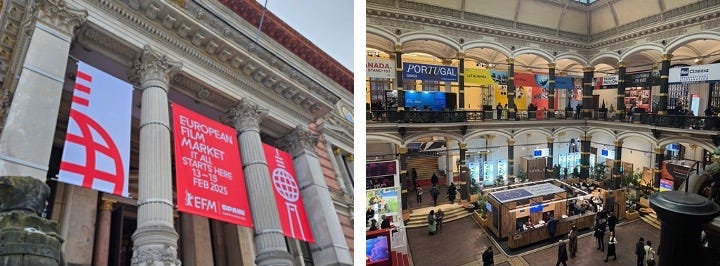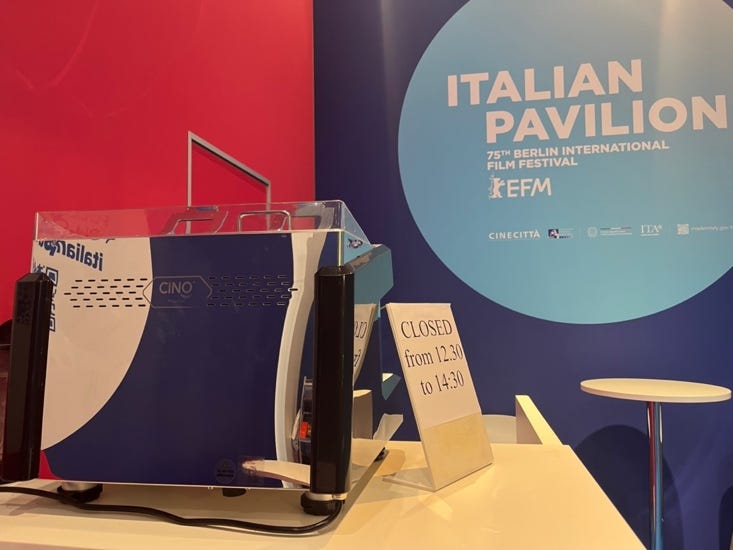When my sister and I were children, my mother Jessica often sang the Teddy Bear Picnic song. It’s been popular in the UK and Ireland since it was written more than a century ago. (My mother was Scottish.)
Jessica loved her bears – and her children – and frequently bought stuffed ones. My childhood bear, according to family legend, originally came with my three older sisters and parents on the Empress of Canada ship from England when they emigrated. But in a succession friendlier than that of the Roy family, he eventually became mine.
Brown Teddy was by my side when I decamped to a University of Toronto residence room (where my floor-mates kidnapped him and held him for ransom), on trips around the world, through multiple changes of address. Sadly, friends, Brown Teddy met his end in the fire that gutted my house in 2021.
Last month, was the two year anniversary of my mother’s passing, and I thought about her frequently as I trudged through the slush in Berlin encountering the fiberglass Berlin Buddy Bears, the city’s mascot meant to promote ‘tolerance’ and cosmopolitanism.
The 75th Berlinale
Founded in 1951 in the ruins of post-World War II Germany, the Berlinale is one of Europe’s Big Three film festivals (alongside Venice and Cannes), and one of the top five in the world (add in Toronto and Sundance).
Hundreds of films are screened at multiple venues mostly around Potsdamer Platz, a symbolic if unattractive area of the city close to the Brandenburg Gate and the Reichstag (German parliament). Filmmakers, actors, celebrities and producers flood in; festival parties and meetings are had; prizes are given out.
Being the most political of the film festivals, there were of course speeches, demonstrations, denunciations – and a little more glamor than usual for Berlin, given the new tenure of festival director Tricia Tuttle, who made the jump from the BFI London Film Festival a year previous.
Tilda Swinton, accepting the Golden Bear Lifetime Achievement award, denounced “state-perpetrated and internationally-enabled mass murder [that] is currently actively terrorizing more than one part of our world” without naming specifics.
There were speeches against Israel, renewed calls of antisemitism against the festival and a red-carpet vigil for Israeli actor David Cunio who was abducted by Hamas on October 7 (and still held hostage alongside his brother; his wife and three-year-old twin daughters were released earlier). Cunio was the subject of a movie in this year’s festival.
The spectre of the German election hung over the festival (and all over the city in competing political signs). Europe was reeling by the pro-Russian moves of President Trump and their implications for future security on the continent. Every American delegate I met started by apologizing for the reckless and dangerous actions of their president.
In the toilet stall, an audience member put up notes saying Friedrich Merz, likely to be next German Chancellor, must never partner with the AfD (the far-right party which doubled its share of the popular vote from 10-20% in the election).
After the screening of the Romanian political satire Kontinental ’25 which won the Silver Bear for best screenplay, the director Radu Jude wrote FUCK PUTIN + TRUMP across his official portrait.
As the festival opened, Tricia Tuttle set out its position calling for a mutually respectful dialogue around even the most divisive issues.
“We value and protect free speech, but as we have seen in online spaces all over the world, an advocacy for free speech alone is not enough. We have to bring kindness, care about facts, and the desire not only to speak but also a hope that people might hear us.”
There were of course calls to boycott the festival in advance. Few filmmakers did. I admired the Berlinale’s desire to stand up for dialogue while simultaneously protecting the right of artists to freely express themselves, within the context of German hate speech law.
Book and film festivals are part of fragile ecosystems that look sturdier than they are (at least to those unburdened by their production). As we’re beginning to find out with literary festivals in the UK and Canada, pull out some of the bricks and Humpty Dumpty begins to fall.
At a time when culture faces strong headwinds of censorship, funding, broken distribution models and changing attendance patterns, it’s a consequential approach to dissent.
European Film Market
Simultaneous to the Berlinale, the European Film Market takes place during the first week of the festival. Drawing 10,000 industry delegates, the EFM is a large trade fair where people meet to sell, buy, pitch or screen films and television series.
The picture above was the morning before the opening in Gropius Bau, the main exhibit hall with four floors of meeting rooms, lecture theatres and trade exhibition booths by every country. Within the country sections, individual production companies and film commissioners had their own desks or tables.
Additionally, most of the workshops, panel conversations and screenings took place at other nearby venues, with shuttle buses to ferry you between.
I had a great series of meetings, mostly with European production companies who specialize in co-productions (two of the television series I’m writing are co-pros), as well as the film commissioners who oversee the tax rebates for films/series shooting within their countries.
(Not surprisingly, the Italian Pavilion had the best espresso. But even in the midst of a busy trade fair, they kept to their standards and closed for a two-hour lunch break!)
The Europeans have gone all-in on generous tax rebate schemes. (The reimbursement of eligible costs spent in their jurisdictions.) Depending on the country, they range from 30-55% with high (or no) caps on the amount provided.
Culture is a serious driver of GDP in Europe – second only to textile – while costing European governments only .9% of their budgets.
Worldwide, UNESCO estimates that cultural and creative industries generate annual revenues of almost US$ 2.3 trillion globally, contributing 3.1 per cent of the global gross domestic product (GDP) (UNESCO, 2022a, 2023).
Film/TV is big business, and Europe not only offers excellent funding schemes but also highly trained crew, production hubs with top-end equipment and studio space, and film commissioners who offer in-depth assistance including location scouting and assistance with permitting.
In Europe (and the UK), film and high-end TV production has regained and/or surpassed pre-pandemic levels, with some exceptions including France and Ireland. The UK saw a 31% increase in 2023 alone. This is not true in the US and Canada, which is still feeling the impact of the WGA, DGA and SAG-AFTRA strikes.
(Larger budget films and series have seen a better bump than small budget.)
The quality of the tax incentive matters. For example, the UK offers a 25-40% refundable tax credit with no cap on above-the-line expenses (writers, directors, producers, actors) or annual funding. A much better incentive than Canada or most US states, hence the huge amount of production that has shifted there.
While the US Film and TV industry is still a powerhouse, employing more than three million people, the global production landscape is shifting fast. Initiatives such as Stay in LA, which aims to increase production in LA after sharp decreases, face a steep uphill battle.
Crime Pays
It is, in fact, true that the only thing you can find on the streaming services are crime thrillers. Last year, they accounted for 44% of all film and series commissioned in Europe.
The current desire is to produce very localized content that can travel to other jurisdictions (as opposed to a few years ago when shows were sanitized of local details in an attempt to make them more globally appealing). Thrillers are thought to travel the easiest, while humor and drama can be very regionally dependent.
The recent trend to focus on underlying IP (a book, video game, magazine article, etc) remains strong because broadcasters/streamers assume that brings a pre-existing audience to the show. In a very crowded content market where series need to find their groove in the first season in order to get renewed, every potential eyeball is counted.
Production companies are adapting IP (or a piece of an IP) is innovative ways. For example, Maxton Hall is a six-part German language series for the young-adult market, set in Britain and adapted from a British novel. It was the largest ever Prime Video international launch (dubbed into 20 languages and subtitled for 40 territories).
All fuelled by social media – and of course, now renewed for a second season.
AFM and TIFF
The American film market, a much smaller event founded in 1981, has struggled in recent years. Traditionally held in LA, it moved to Los Vegas in the fall of 2024 and produced a complete flop. It’s scheduled to move back to LA for 2025, but the Toronto International Film Festival is making a play for that space, backed up by $23million dollar investment from the federal government.
Roeg Sutherland, head of finance for Creative Artists Agency (CAA), is on the advisory council for the initiative. Sutherland’s the son of Donald, brother of Kiefer. In his EFM talk, he was bullish on TIFF’s chances to become the pre-eminent market in North America. He also believed that the worst of the market ‘contractions’ for film/tv was over.
The Europeans are very keen on co-productions and in particular with Canadian producers, given the existing treaties and the US political situation. My meetings continue post festival with some very large French-based TV production companies. I’ll keep you posted!
Thank you very much for joining me for this thirty-fourth edition of Letterbox. Until next time, friends, when hopefully spring will have descended.









